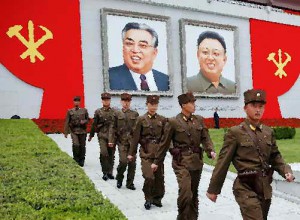 North Korean regime is known as one of the most anti-religious one. Even though North Korea has established some churches and reopened some Buddhist temples since the early 1980s, it is believed that North Koreans can not have or attend religious meetings without permission of the Party. Ironically, some Western and South Korean scholars assert that the political culture of North Korea includes obvious religious characteristics.
North Korean regime is known as one of the most anti-religious one. Even though North Korea has established some churches and reopened some Buddhist temples since the early 1980s, it is believed that North Koreans can not have or attend religious meetings without permission of the Party. Ironically, some Western and South Korean scholars assert that the political culture of North Korea includes obvious religious characteristics.
They believe that North Koreans worship Kim Il Sung and Kim Jong Il not as mere national leaders but as a sort of gods. They also believe that some elements of North Korea’s various religious traditions are absorbed into the Kim Il Sung and Kim Jong Il cult. This presentation is prepared for explaining the relationship between North Korea’s religious traditions and its political culture.
This presentation has two main purposes: the first is to explain how North Korea’s religious traditions affected North Korea’s political culture; the second is to show how religious elements are mobilized by North Korean party-state for reinforcing the legitimacy of the regime. This presentation is mainly based on three sources: the analysis of North Korean books on Kim Il Sung and Kim Jong Il; North Korean newspaper and magazine articles deifying Kim Il Sung and Kim Jong Il; reports from North Korean defectors on deification of Kim Il Sung and Kim Jong Il.
I believe that this presentation will clarify the following: First, the most important difference between the idolization of Kim Il Sung and Kim Jong Il and that of other communist leaders is not the magnitude or duration but the absorption of the idolization doctrines into the official ideology. The doctrine of idolization of Kim Il Sung and Kim Jong Il became the essential parts of North Korean official ideology, the Juche ideology. Second, as a result of the absorption of the Kim Il Sung and Kim Jong Il cult into Juche ideology, this ideology became a sort of religious doctrine.
Third, even though only Confucianism was spotlighted by North Korea specialists, shamanism and Christianity are important elements in North Korean ideology and political culture. Christianity particularly played an important role in establishing Kim Il Sung and Kim Jong Il cult. Because of the monotheistic characteristics of Christianity, Kim Il Sung and Kim Jong Il cult absorbed various elements of Christianity in terms of doctrine and religious practice.
Last, North Korean party-state intentionally utilized various religious elements for reinforcing the legitimacy of the regime despite its overt oppression of religions. Until now, this strategy seems to be successful.
Created by LEE Sang-Keun

Thanks a lot for giving everyone such a superb opportunity to discover important secrets from this site. It is often very pleasurable plus jam-packed with fun for me personally and my office fellow workers to search your site at minimum 3 times in 7 days to study the fresh items you have got. And lastly, I’m also actually motivated with all the eye-popping knowledge served by you. Certain 4 areas in this article are in fact the finest I’ve ever had.
I spent a lot of time to locate something similar to this